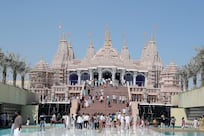Despite all their troubles, the Palestinians are quietly getting on with the job of building a modern economic entity in their homeland. While the international news from the region this week has been dominated by the obstacles to a lasting peace settlement with Israel and renewed outbreaks of violence on the West Bank and Gaza, a group of Palestinian financiers were meeting in the swanky environs of London's West End hotel-land.
Their aim was to sell the region to international investors, and more particularly to persuade the global investment industry of the attractions of the Palestine Securities Exchange (PSE). The Palestinians have their own stock exchange - in fact, have had one since 1997 - and it is older than many in the Middle East. By any standards, it has to be judged a success, but against the background of the turmoil and violence of the region in those years, and the regular military interruptions to normal economic life, it is a symbol of the remarkable resilience of the Palestinian people.
Based in Nablus and Ramallah, two cities on the West Bank more familiar with the IDF than with IPOs, the PSE has learned to deal with extreme situations. "The Palestinian private sector is renowned for its ability to deal with difficult and unexpected situations," says Ahmed Aweidah, the PSE chief executive. "There have been many occasions when trading sessions took place during curfews with Israeli tanks outside the door. It's the modus operandi for Palestinians."
Such problems put even the whirlwind of a global financial crisis into perspective. The PSE has weathered it well, as the second best performing Middle East exchange in the tumult of 2008, then bouncing back sharply in 2009, ending that year with an increase of 11 per cent. So far this year, its key indicator, the Al Quds Index, is about 7 per cent ahead. Mr Aweidah says that since its inception the PSE has shown an average annual growth rate of 17.5 per cent.
"Most Palestinian companies are well managed and not highly leveraged," says Mr Aweidah. "They are built round the strategy of planning for adversity." There are 39 stocks listed on the PSE, mainly telecommunications, construction and financials. The largest is PalTel, the local mobile communications provider, of which Mr Aweidah was formerly the chief executive. That number is expected to increase significantly this year, as seven more companies prepare to float on the PSE. The biggest is Wataniya, another mobile company and the local offshoot of QTel of Qatar, which is planning a US$187 million (Dh686.7m) listing. This will be followed by listings in the property and investment sectors, and even the initial public offering (IPO) of stock of a Palestinian football club based in Chile. Such is the spread of the Palestinian diaspora.
The most significant IPO could be that of the PSE itself. Just last month the exchange moved from private to limited company status, in a move designed to prepare it for a flotation, probably by the end of the year. This would involve the placing of a 25 per cent stake by the PSE's owner, the investment group Padico, which holds 78 per cent of the shares in the PSE. Samir Hulileh, Padico's chief executive, explained that the planned listing was designed to broaden PSE's exposure to global investors. "The ones we met in London were extremely interested in us and in 'frontier' markets, and very keen to know more about us," he says.
The balance of PSE shares are held by 12,000 private investors in the West Bank and Gaza, but it also has some friends in high places, like Prince Alwaleed bin Talal bin Abdulaziz Al Saud, the Saudi billionaire, and the British investment group Blakeney Management, both big shareholders. The London roadshows were a further opportunity to extend international alliances. The meetings were endorsed by Lord Freud on behalf of the Portland Trust, an organisation sponsored by wealthy Jewish businessmen in Britain with a view to encouraging economic growth and financial investment in Palestine.
Tony Blair, the former British prime minister now Middle East special envoy, was due to attend the London meetings, but was called away at the last minute to a meeting of the "Quartet" powers in Moscow. He sent a message of support instead. "Mr Blair has been a true friend of the exchange," says Mr Aweidah. Contacts like that will ease the next phase of PSE's development. Mr Aweidah wants to attract investors who can offer specific expertise in share trading, perhaps a current listed exchange or a financial institution that has already financed stock exchanges.
Mr Hulileh says there has been little interest so far from UAE investors, apart from private Palestinian expatriates living in the Emirates. Perhaps this is a golden opportunity for the Dubai Financial Market or the Abu Dhabi Securities Exchange to further their regional ambitions, and show their practical support for the Palestinian cause. fkane@thenational.ae





